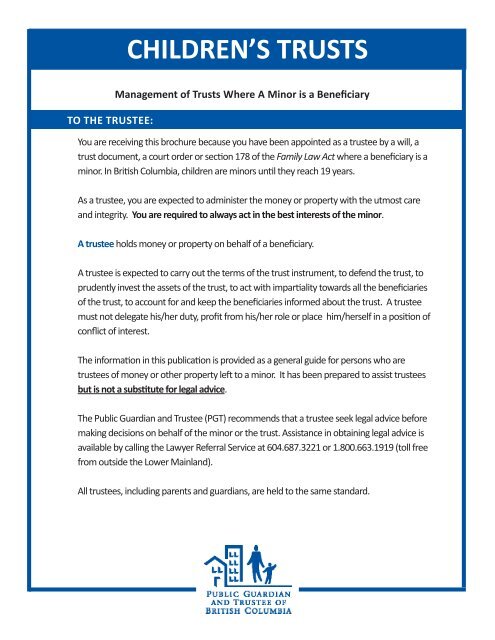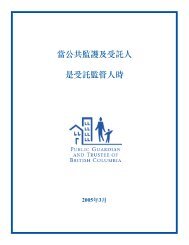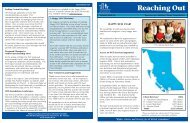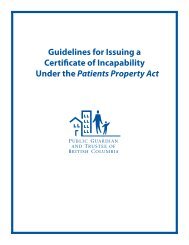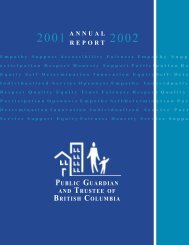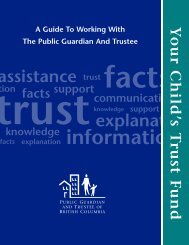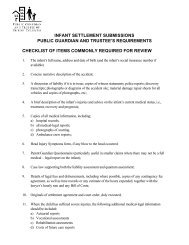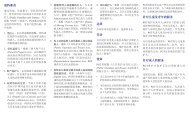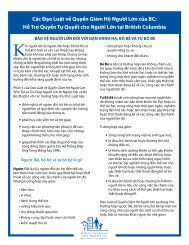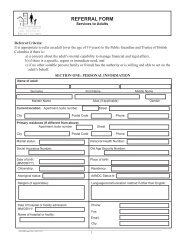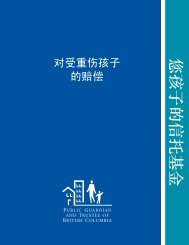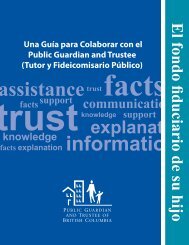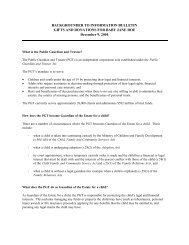Children's Trusts - Public Guardian and Trustee of British Columbia
Children's Trusts - Public Guardian and Trustee of British Columbia
Children's Trusts - Public Guardian and Trustee of British Columbia
Create successful ePaper yourself
Turn your PDF publications into a flip-book with our unique Google optimized e-Paper software.
CHILDREN’S TRUSTS<br />
TO THE TRUSTEE:<br />
Management <strong>of</strong> <strong>Trusts</strong> Where A Minor is a Beneficiary<br />
You are receiving this brochure because you have been appointed as a trustee by a will, a<br />
trust document, a court order or section 178 <strong>of</strong> the Family Law Act where a beneficiary is a<br />
minor. In <strong>British</strong> <strong>Columbia</strong>, children are minors until they reach 19 years.<br />
As a trustee, you are expected to administer the money or property with the utmost care<br />
<strong>and</strong> integrity. You are required to always act in the best interests <strong>of</strong> the minor.<br />
A trustee holds money or property on behalf <strong>of</strong> a beneficiary.<br />
A trustee is expected to carry out the terms <strong>of</strong> the trust instrument, to defend the trust, to<br />
prudently invest the assets <strong>of</strong> the trust, to act with impartiality towards all the beneficiaries<br />
<strong>of</strong> the trust, to account for <strong>and</strong> keep the beneficiaries informed about the trust. A trustee<br />
must not delegate his/her duty, pr<strong>of</strong>it from his/her role or place him/herself in a position <strong>of</strong><br />
conflict <strong>of</strong> interest.<br />
The information in this publication is provided as a general guide for persons who are<br />
trustees <strong>of</strong> money or other property left to a minor. It has been prepared to assist trustees<br />
but is not a substitute for legal advice.<br />
The <strong>Public</strong> <strong>Guardian</strong> <strong>and</strong> <strong>Trustee</strong> (PGT) recommends that a trustee seek legal advice before<br />
making decisions on behalf <strong>of</strong> the minor or the trust. Assistance in obtaining legal advice is<br />
available by calling the Lawyer Referral Service at 604.687.3221 or 1.800.663.1919 (toll free<br />
from outside the Lower Mainl<strong>and</strong>).<br />
All trustees, including parents <strong>and</strong> guardians, are held to the same st<strong>and</strong>ard.
MAKING INVESTMENT DECISIONS<br />
A trustee’s first step is to determine how the trust funds will be invested. If the<br />
document which creates the trust does not specify how the funds will be invested, a<br />
trustee is required to comply with the <strong>Trustee</strong> Act. The Act states that “a trustee must<br />
exercise the care, skill, diligence <strong>and</strong> judgment that a prudent investor would exercise in<br />
making investments”.<br />
An un<strong>of</strong>ficial convenience version <strong>of</strong> the <strong>Trustee</strong> Act is found at:<br />
http://www.bclaws.ca/<br />
A trustee should obtain pr<strong>of</strong>essional advice from a financial advisor <strong>and</strong>/or a lawyer when<br />
investing trust money. The original trust money that a trustee receives on behalf <strong>of</strong> a<br />
minor is called the capital while income is money that the capital has earned while<br />
invested. Some criteria that may be considered when determining if an investment is<br />
prudent include:<br />
• adopting a balanced investment strategy<br />
• protecting capital <strong>and</strong> providing income<br />
• choosing suitable risk <strong>and</strong> return objectives<br />
• having a reasonable diversity <strong>of</strong> investments<br />
• using caution in delegating authority to agents (e.g., to mutual fund managers)<br />
• incurring only reasonable <strong>and</strong> appropriate costs<br />
SETTING UP THE INVESTMENT<br />
When a trustee invests the funds, the trustee must ensure that the investment is<br />
registered in the name <strong>of</strong> the trust or on behalf <strong>of</strong> the beneficiaries <strong>of</strong> the trust. If the<br />
investment is not registered in the name <strong>of</strong> the trust, a false impression may be created<br />
that the trustee personally owns the investment.<br />
Money held in trust by a trustee belongs to the beneficiary <strong>of</strong> the trust <strong>and</strong> not to the<br />
trustee. A trustee holds <strong>and</strong> protects the trust money <strong>and</strong>, if authorized by the terms <strong>of</strong><br />
the trust or the <strong>Trustee</strong> Act, uses the money for the exclusive sole benefit <strong>of</strong> the<br />
beneficiary (minor).<br />
Children’s <strong>Trusts</strong><br />
Page 2 <strong>of</strong> 6
A trustee cannot personally benefit from the trust money. A trustee cannot borrow the<br />
trust money or lend it to anyone else. Any major bank, credit union or trust company can<br />
assist a trustee in setting up a trust account.<br />
DUTY TO KEEP TRUST MONEY SEPARATE<br />
A trustee must not mix trust funds with his/her personal funds. The trust money must<br />
not be held in a trustee’s personal account or in an account which is held jointly with the<br />
beneficiary (minor). No person other than the trustee should have signing authority for<br />
the trust account.<br />
RELEASING FUNDS FROM THE TRUST<br />
A will, trust document, or court order may give a trustee discretion to make<br />
expenditures from the trust <strong>and</strong>/or release part or all <strong>of</strong> the trust money for the minor<br />
before the termination <strong>of</strong> the trust. The will, trust document, or court order will specify<br />
whether the trustee is authorized to release income or capital or both. A trustee is not<br />
allowed to delegate his/her discretion to make expenditure decisions.<br />
Where a will, trust document or court order gives the trustee authority to allow early release<br />
<strong>of</strong> part or all <strong>of</strong> the funds <strong>and</strong> the trustee has exercised his/her discretion in favour <strong>of</strong><br />
releasing part <strong>of</strong> the funds, the trustee is normally required to ensure that the funds are used<br />
for the purpose the trustee has authorized.<br />
Sometimes, a will, trust document or court order will authorize a trustee to release part<br />
<strong>of</strong> the funds to the minor’s parents or guardians with instructions as to how the funds are<br />
to be used.<br />
If you are acting as trustee under section 178, <strong>of</strong> the Family Law Act, the trustee is<br />
required to follow the <strong>Trustee</strong> Act when considering whether or not to make<br />
expenditures from the trust.<br />
If a trustee is unsure if he/she has authority to release any <strong>of</strong> the funds from the trust or<br />
is unsure about the extent <strong>of</strong> that authority, the trustee should consult a lawyer.<br />
Children’s <strong>Trusts</strong><br />
Page 3 <strong>of</strong> 6
A trustee is personally responsible for any losses to the trust money arising from<br />
improper or unauthorized release <strong>of</strong> the trust funds or trust property.<br />
RECORD KEEPING AND ACCOUNTABILITY<br />
A trustee is accountable for the management <strong>of</strong> the trust funds. A trustee must keep a<br />
record <strong>of</strong> all transactions in relation to the trust money. A trustee should keep all<br />
financial statements detailing income earned by the trust, as well as a record <strong>of</strong> all<br />
expenditures from the income or capital <strong>of</strong> the trust.<br />
Unless the will, trust document, or court order says otherwise, a trustee is required to<br />
account in accordance with the <strong>Trustee</strong> Act.<br />
The <strong>Trustee</strong> Act requires an executor or a trustee under a will to present his/her first set<br />
<strong>of</strong> accounts to the court for a “passing <strong>of</strong> accounts” within two years from the date<br />
probate was granted <strong>and</strong> to pass subsequent accounts at the times the court directs.<br />
Under normal circumstances, trustees can provide copies <strong>of</strong> their accounts to a minor’s<br />
parents or guardians from time to time so that the parents or guardians may be<br />
satisfied that their minor’s interests are well protected. Sharing the accounts with the<br />
parents or guardians may help prepare their minor to receive the money or property when<br />
the trust comes to an end. If the parent or guardian is a trustee, there is no requirement<br />
to share the accounts with a third party but detailed records <strong>and</strong> accounts should be<br />
maintained.<br />
If any person, including a minor beneficiary has reason to believe that the trustee may not<br />
be managing the trust funds appropriately according to law, he/she may contact the PGT.<br />
The PGT may investigate <strong>and</strong> may require the trustee to produce the accounts to the PGT.<br />
Children’s <strong>Trusts</strong><br />
Page 4 <strong>of</strong> 6
TERMINATION OF THE TRUST<br />
A trustee must continue to hold the trust funds for the period stipulated in the will, trust<br />
document, court order, or until age 19 unless a will states otherwise. A trustee may not<br />
end the trust early by paying the money to a minor or the minor’s parents or guardians. A<br />
trustee cannot appoint someone else to act as trustee in his/her place unless it is<br />
authorized in the will or trust document.<br />
If a trustee is unable to continue in the role <strong>of</strong> trustee, an order from the Supreme Court<br />
<strong>of</strong> <strong>British</strong> <strong>Columbia</strong> is required appointing a successor trustee. If there is a compelling<br />
reason for a trustee to be discharged from his/her duties before the end <strong>of</strong> the trust<br />
period, the trustee should consult a lawyer.<br />
At the termination <strong>of</strong> the trust, a trustee must provide final accounting to the<br />
beneficiary. After the beneficiary has approved the accounts <strong>and</strong> released the trustee,<br />
the trustee must transfer the trust money to the beneficiary or the beneficiary’s legal<br />
representative. A trustee should obtain confirmation <strong>of</strong> receipt <strong>of</strong> funds from the<br />
beneficiary.<br />
Children’s <strong>Trusts</strong><br />
Page 5 <strong>of</strong> 6
Contact the <strong>Public</strong> <strong>Guardian</strong> <strong>and</strong> <strong>Trustee</strong><br />
Child & Youth Services<br />
<strong>Public</strong> <strong>Guardian</strong> <strong>and</strong> <strong>Trustee</strong><br />
700-808 West Hastings Street,<br />
Vancouver, BC V6C 3L3<br />
Tel: 604.775.3480<br />
email: cys@trustee.bc.ca<br />
www.trustee.bc.ca<br />
email: webmail@trustee.bc.ca<br />
Toll free calling is available through<br />
Service BC. After dialing the appropriate<br />
number for your area (below), request to<br />
be transferred to the PGT (regular <strong>of</strong>fice<br />
hours 8:30am-4:30pm, Mon-Fri).<br />
Vancouver 604.660.2421<br />
Victoria 250.387.6121<br />
Elsewhere 800.663.7867<br />
March 2013<br />
Children’s <strong>Trusts</strong><br />
Page 6 <strong>of</strong> 6<br />
13-3#12A


